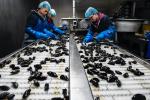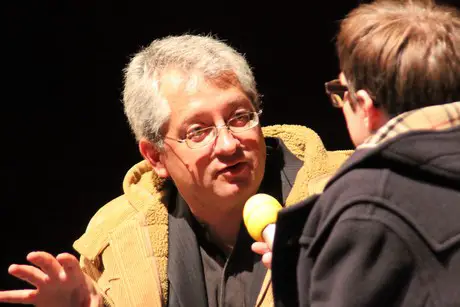Stephanie Mills: Epicurean Simplicity
Is a simple life the key to happiness?
In her book “Epicurean Simplicity,” author and activist Stephanie Mills analyses what is wrong with our modern way of life – and she goes back to the philosophy of Epicurus to find a cure. Mills’ book is as beautiful and relaxing as it is inspiring – a passionate plea for a life well-lived, a life that is less wasteful and more meaningful.
This article is part of The Ultimate Guide to Epicurus.
If you like reading about philosophy, here's a free, weekly newsletter with articles just like this one: Send it to me!
What is the best human life available today?
The central question in any critique of modern life is: how can we live a better, less alienated, more satisfying, more valuable life in today’s world?

One of his best known concepts of Marxism is the idea of “alienation” that describes how human beings get estranged from their work.
Stephanie Mills, an environmental activist and writer of books about the wonder of small things for five decades, begins her book “Epicurean Simplicity” (2003) with a description of her life in the US countryside.
She lives in a cottage in the Upper Midwest of the United States, a rural place surrounded by forests, rivers and lakes. A place that is peaceful and that allows her to live in contact with nature, but that is also demanding: its winters cold and long, and its summers hot and dry.
In this situation, Mills lives alone, sharing her life with the land all around her home (she famously and publicly early in life decided to not have children [video], for ecological reasons). In the book, she describes bicycle trips for shopping in the small town nearby, swimming in a pond, skiing through a pine forest in deep snow and observing a wide variety of wildlife around her house.
In the beginning of the book, she asks how we can today justify living the way we do:
And her answer to the question “How am I to live?…” is, simply: “more locally.” The long-distance supply lines we’ve set up for our most common everyday needs and wants are an immense burden on the environment and threaten our very existence in the relatively near future: Strawberries from California, fish from Vietnam, milk from Indonesia, steaks from Argentina, fruit from New Zealand, butter and cheese from Denmark, eggs from Poland, pesto from Italy and pasta and juices from Greece. This is just a random assortment of things I saw today in my local groceries shop… in Hong Kong.

Out-of-season goods like those strawberries require immense amounts of fossil fuels and other chemistry, not only for their transport, but also for their production: fertilisers, pesticides, energy for heating and cooling of green- and warehouses, machines for harvesting, sorting, processing and packaging. Not to speak of the perversity of wrapping a bunch of bananas into a bag of transparent plastic for sale.

A comprehensive overview of Erich Fromm’s philosophy of happiness. We discuss his life, his ideas and his main works, both in their historical context and how they are still relevant for us today.
Epicurean country life
This is where Epicurus comes in:
For Mills, one of the attractive features of Epicureanism is how this philosophy is rooted in the tangible and the sensual, rather than in abstract ideals:
The same thought can also motivate us to take better care of the environment surrounding us. As long as we believe that there’s another existence awaiting us after this one, whether this is a reincarnation, or an eternity sitting at the side of God, we will be much less inclined to do the work that is necessary to save this world we live in now from a catastrophic end. And our current illusions of relocating to Mars, to the Moon, to orbital stations, or spreading humanity across the Galaxy are just another facet of the same old dream of an eternal, blessed life “somewhere else.” Accepting that this world is all we have, is, like the acceptance of the addict that he is, in fact, an addict, the first, necessary step for working towards a solution for the ecological and other problems we have created on Earth.

Life Is a Skill
Aristotle on living a life well through exercising one’s virtues.
The problems of technology
For Mills, rejecting some technologies is part of that solution. Of course, she too uses “a small electric heater,” a wood stove and an assortment of boots, skis, reading glasses, and, I assume, pots, pans and electric light. These days, her videos reach us through the Internet and her books are available on Kindle. There is no way to be an activist, even one against technology, without actually using that very technology that one is criticising. Still,
She points out that “a long and persistent tradition argues against the technologies that supplant skill, neighborliness, good work, and, increasingly, mere employment.”
We talked previously about Erich Fromm’s criticism of technology and the relationship between Epicureanism and Luddism. Mills has a somewhat similar approach. The point of criticising technology as an Epicurean is not to promote living in caves, or to welcome hardship in everyday life, but to actually improve one’s quality of life. This will happen by,
first, escaping the imperative to chase after the newest technologies; and,
second, by stopping that loss of skills and meaning that comes with the adoption of technologies in our everyday lives.
In times not so long past, people were able to build a house or a sturdy fence, to sew and to mend their own clothes, to make and repair their furniture, to plant and take care of a garden, to milk a cow or a goat, to make a fire and cook, and to take care of their own entertainment by playing music at home.
Now go through that list once more and see how many of these skills you still have. Or your spouse. Or your children. Or your friends. (No, I’m not better myself, sadly).

Old Age and Death
The ancient Greek philosopher Epicurus emphasises that, in a world that works according to physical laws, nobody ought to be afraid of either the gods or one’s own death.
What we are losing when we let technology manage our lives is not only the drudgery of the daily chores, but also a big part of what makes life meaningful and what gives us a feeling of worth and empowerment: the knowledge that we have the skills to lead a full life, that we are human beings in control of our destiny, rather than powerless appendages of a society that will take care of everything for us.

Because when we accept society’s offer of a microwaved, packaged meal, a cheap piece of clothing or a new chair from IKEA, we are not necessarily making as good a deal as we think. With every gadget that improves our lives, we lose one chance to be ourselves the agents of our lives’ improvements. With every cheap thing that does a chore for us, we give ourselves over to a dependence on this army of things, we surrender a little bit of our freedom and our autonomy and become slaves to a system that we are unable to control, influence, or even leave if (or when) it turns bad.
Stephanie Mills:
In our own lives…
If you are interested in beautiful prose, in richly evocative images of a life lived simply and in harmony with nature, then Stephanie Mills’ book is a treasure that you shouldn’t miss. It has certainly changed the way that I think about the world in so many different little ways, and it will probably do the same for you.
Here is Stephanie Mills’ book “Epicurean Simplicity.” It is a tender meditation on what makes life worth living and a declaration of love to nature and to life.
Amazon affiliate link. If you buy through this link, Daily Philosophy will get a small commission at no cost to you. Thanks!
For the coming week, let us then try to consider some of Mills’ suggestions for improving our quality of life, while, at the same time, living a little more in harmony with nature.
The easiest way to start is by looking at one’s fridge. Try to identify where all the stuff in there has come from. How much transport is hidden in the contents of that one fridgeload of food? How much fossil fuel? How much chemistry in the sweets, pesticides in the fruit, bovine growth hormones in the milk, antibiotics in the chicken meat and needless packaging that is kept cold at your expense until it’s finally thrown away? And do you really need every single thing in there that has been flown in from Indonesia, Argentina or Belgium?
Small, everyday changes are often a lot more meaningful than sweeping, conceptual commitments. Just don’t buy those California strawberries in December any more. Instead of frozen, microwaved food, try some fresh ingredients and a Youtube video that teaches how to cook a dish you like.
Even better: buy the ingredients locally instead of driving to the super market. Your nearby farmers’ market will not only have fresher and healthier goods on offer, but you will also make new acquaintances talking to the farmers and sellers, discussing their products with them. For Epicurus, as for Stephanie Mills, friendship and community is one of the main pleasures of life. Instead of being stuck in a long queue of faceless people at the super market checkout line, eyes hurting in the glare of the overhead neon lights, you can stroll through quirky and beautiful stalls of flowers, stacks of home-made cheese and lovingly arranged displays of all sorts of fresh, seasonal vegetables, while chatting with friends and enjoying the fresh air and the sunshine.
And it is even easier than that to regain control of our lives by reclaiming some of the ancient skills of mankind: all that is needed is the phone or computer you’re reading on right now. Think of a skill that you’d always wanted to have and search for a Youtube video that teaches that skill. Sewing, cooking, making fire, carving little figures of wood, knitting, writing short stories, cooking, playing the piano and a myriad other skills are all available for free at the press of a key.
We live in a world that provides us with endless opportunities to improve ourselves and to make our lives richer and more meaningful — many more opportunities than any generation of human beings ever had before in history. But instead of grabbing these opportunities and actually making our lives better and richer, we look away and spend our free time bingeing on bad TV.
Epicurean happiness and fulfilment is not a remote dream that is only available to people living in a charmed cottage in the country, in the middle of acres of one’s own land. Everyone can reclaim a bit of one’s original human dignity in a few minutes a day, with nothing more than one’s phone.
What are we waiting for?
◊ ◊ ◊
Thanks for reading! If you find that this article inspired you to change something in your life, why not tell us about it in the comments?
By the way, if you are curious about Stephanie Mills, here is a video of her giving a short talk:
and you can find her homepage here:
(Note that there’s another Stephanie Mills, who appears to be a singer; I imagine that it would be confusing to end up on the singer’s page, trying to find advice on Epicurean simplicity ;))
Return to The Ultimate Guide to Epicurus.

Andreas Matthias on Daily Philosophy:
Cover image by L’odyssée Belle on Unsplash.






